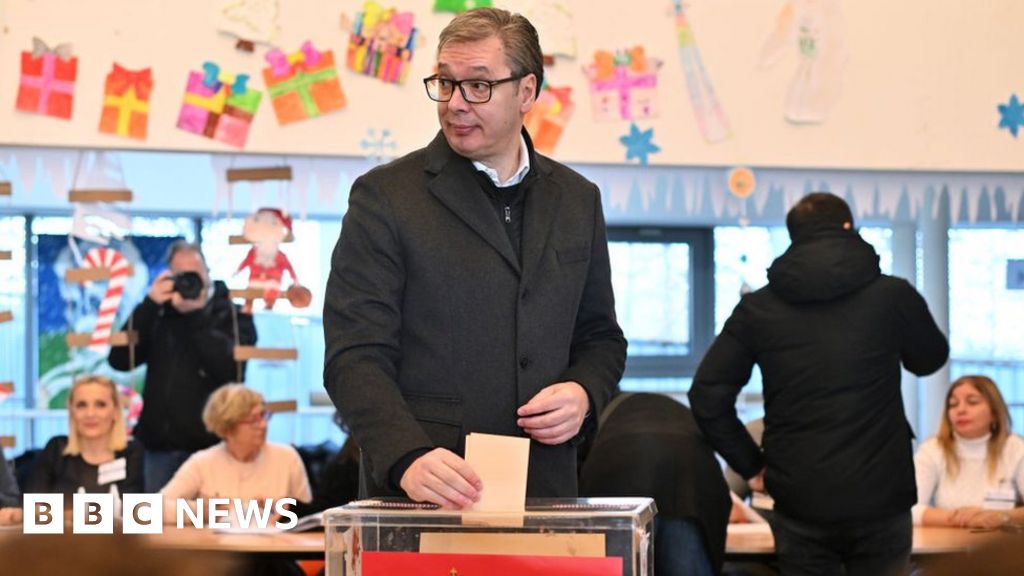- By Paul Kirby & Dearbail Jordan
- BBC News
Image source, Oliver Bunic/Bloomberg via Getty Images
President Vucic called the snap vote in the hope of extending his party’s 11-year rule
Serbian President Aleksandar Vucic’s party has taken a commanding lead in snap parliamentary elections, an exit poll suggests.
His Serbian Progressive Party, or SNS, was widely expected to maintain its majority in parliament.
A projection based on a sample vote count gave the SNS 46.6% of the vote.
Opposition parties under the Serbia Against Violence banner are well behind with 23.3% of the vote, according to the exit poll.
However their biggest hope is to challenge the president’s party in Sunday’s local elections, especially in the capital Belgrade.
Early election results from more than 800 of Serbia’s 8,273 polling stations confirmed the ruling party’s lead. That kind of margin would give the SNS and its ally an overall majority in Serbia’s National Assembly.
Irregularities were reported at a number of polling stations in Serbia by non-government observers.
The SNS has been in power since 2012 but there have been three elections in the past three years. President Vucic said on Sunday that he expected “a good turnout and a decisive victory”.
The loose opposition alliance was formed after two mass shootings in May which sparked huge protests. The attacks killed 19 people, including 10 at a school in Belgrade.
The protests grew into demonstrations against President Vucic and his SNS party.
Opposition parties said the massacres reflected a culture of rhetorical and physical violence promoted by the ruling party and its allies in the media.
Serbians voted on Sunday for both the 250-seat parliament and to decide who will control 65 local authorities.
If the loose Serbia Against Violence opposition coalition does succeed in winning power on Belgrade’s city council, commentators say it would give them a big boost and undermine the position of President Vucic and his party.
Almost one in four Serbian voters lives in the capital.
Local observers reported various irregularities, including voters being bussed in from Bosnia-Herzegovina to vote in Belgrade.
The CRTA observer mission gave details of attempted ballot rigging in a number of polling stations.
After voting in Belgrade, Dragan Djilas, a leader of the coalition and a former Belgrade mayor, told reporters that “changes in Serbia have begun.”
“People are determined to live… normally without crime and corruptions, without prices going wild.”
Serbia is also struggling with high inflation, which hit 8% in November.
Serbia is a candidate to become a member of the European Union, and President Vucic is under pressure from both the EU and the US to normalise relations with Kosovo.
Image source, REUTERS/Valdrin Xhemaj
Queues formed as ethnic Serbs crossed the Kosovo border to cast their ballot in Serbia
Kosovo declared unilateral independence from Serbia in 2008, and while it is recognised by more than 100 UN members, Serbia has refused to do so – backed by allies like Russia, China and five EU members.
Some 95,000 ethnic Serbs live in Kosovo and those who wanted to vote had to cross into Serbia to cast their ballot.
Serbia has also declined to impose sanctions against Russia over its invasion of Ukraine.

Emily Foster is a globe-trotting journalist based in the UK. Her articles offer readers a global perspective on international events, exploring complex geopolitical issues and providing a nuanced view of the world’s most pressing challenges.








